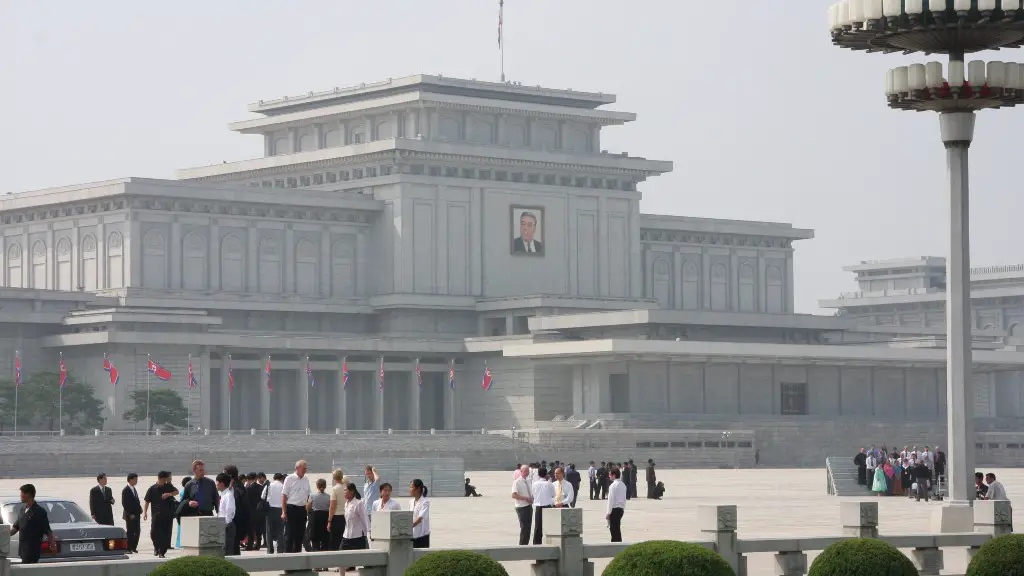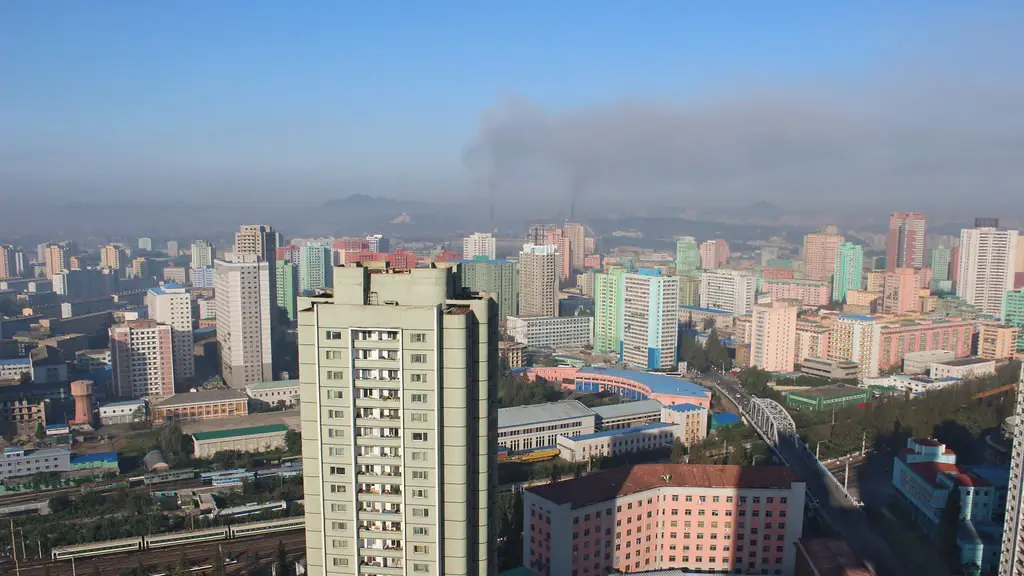Overview
It seems almost unbelievable, but it is happening. In 2017 alone, North Korea tested more than 16 ballistic missiles; an astounding feat, considering how much military hardware the country has at its disposal. North Korea has developed a nuclear weapon, one that can be loaded onto a ballistic missile and launched to a variety of targets. The growing security threats that North Korea poses has led the United States and its allies to consider a war with North Korea. But is a war with North Korea imminent?
To answer this question, one must first look at the current situation. Tensions between North Korea and the United States have reached a new high in recent months. North Korea has been issuing fiery rhetoric, making it clear that it is willing to launch a nuclear attack if provoked. The United States, for its part, has deployed a large military presence to the Korean Peninsula, with President Donald Trump vowing to use “fire and fury” to tame North Korea. On the other hand, China—North Korea’s ally—has been quiet in the face of the growing tensions, refusing to take a stand either against or in favor of North Korea.
Background
In order to assess whether a war with North Korea is imminent, it is important to look at the history of the conflict between the United States and North Korea. The short answer is that there is nothing new or sudden in the immediate security threat posed by North Korea. North Korea has had nuclear weapons since 2006 and has been developing intercontinental ballistic missiles since the 2000s. For more than a decade, the United States has conducted a policy of “strategic patience” with North Korea, hoping that the country would denuclearize peacefully. Unfortunately, this strategy has failed, with North Korea refusing to abandon its nuclear weapons.
In April 2017, the United States abandoned its policy of strategic patience, signaling a shift in approach towards North Korea. Under President Trump, the United States has adopted a policy of “maximum pressure”, imposing tough economic sanctions on North Korea and significantly increasing the deployment of military assets to the region. In response, North Korea has become increasingly provocative, conducting a number of missile tests and issuing tough rhetoric.
Experts’ Perspective
Experts are divided in their opinion on whether a war with North Korea is imminent. Some believe that a war is inevitable, while others think that war can still be avoided. Most experts agree, however, that North Korea would not initiate a war – doing so would be suicidal for North Korea given the overwhelming military forces of the United States and its allies.
According to Bruce Klingner, a senior research fellow at the Heritage Foundation, “The probability of a war is small although none of us have a crystal ball. A miscalculation from either one of the leaders involved would certainly take us down that road.” Klingner believes that a war could still be avoided, if both sides de-escalate tensions and work towards a diplomatic solution.
On the other hand, David Troy, a senior fellow at the Brookings Institution, believes that “a war with North Korea is inevitable”. Troy argues that, given the current tensions, neither side will compromise and that the only solution is a military one. He points out that the United States will not be content to let North Korea continue its nuclear development, as this would threaten US security. He believes that “the only way to ensure that North Korea does not acquire nuclear weapons is a war”.
Perspective From North Korea
North Korea’s perspective is a bit more difficult to assess, due to the tight control the regime has over information coming in and out of the country. However, it is clear that North Korea is committed to its nuclear program and sees it as a viable deterrent against US aggression. The country’s leader, Kim Jong Un, has said that he will not give up this nuclear program for anything and has even threatened to use it against the United States.
It is clear that North Korea seeks to avoid war. The regime has maintained a consistent stance of maintaining peace on the Korean Peninsula and is keenly aware of the overwhelming military might of the United States. North Korea will only resort to war as a last resort.
Impact of China
China’s role in the North Korea crisis cannot be overlooked. China is North Korea’s most important ally, providing the regime with economic and military support. China has refused to take sides in the conflict, instead issuing vague and ambiguous statements calling for peace and dialogue.
China is in a difficult position. If it sides with the United States, it risks severing its diplomatic and economic ties with North Korea. If it sides with North Korea, it risks alienating the United States and its allies. Nevertheless, China’s role in the North Korea crisis is crucial, as it is the one country that can influence the situation and potentially broker a peaceful resolution.
Analysis and Insight
Ultimately, it is difficult to assess whether a war with North Korea is imminent. On the one hand, the current tensions between the two countries are high and both sides seem unwilling to compromise. On the other, the United States and its allies are mindful of the overwhelming military might of North Korea and are seeking to avoid a war at all costs.
The key to resolving the crisis lies in the hands of outside players such as China. China must play a constructive role and use its influence to bring the two sides to the negotiating table. Without external pressure, it seems unlikely that the two sides will reach an agreement.
Impact of South Korea
Another important factor in the North Korea crisis is the role of South Korea. South Korea is in a difficult situation, as it is caught between its close ally, the United States, and its neighbor, North Korea. South Korea does not wish to be dragged into a war and is pushing for a diplomatic solution to the crisis.
South Korea has also taken steps of its own to re-engage with North Korea and reduce tensions. In April 2018, South Korea and North Korea met for the first time in more than a decade. The meeting ended in a joint agreement to improve cross-border relations and take steps towards peaceful reunification.
South Korea is also pushing for North Korea to denuclearize. The South Korean government is willing to provide economic and diplomatic incentives to North Korea if it denuclearizes. South Korea is hoping that these incentives will persuade North Korea to give up its nuclear weapons.
Perspectives of US Allies
The United States is not alone in its stance towards North Korea. Other US allies have taken a firm stance in opposing North Korea’s nuclear ambitions. Japan, in particular, has been vocal in its support for the United States’ position. Japan has imposed tough economic sanctions on North Korea and has strongly rejected any attempts by North Korea to interfere with its security. Japan has also taken steps to bolster its own defense forces, in case a war with North Korea breaks out.
Australia has also taken a strong stance against North Korea. Australia has deployed forces to the Korean Peninsula and is providing the United States with intelligence data. Australia is also looking to increase defense spending, in order to contribute more to the United States-led efforts to contain North Korea’s nuclear ambitions.
International Reactions
With tensions between the United States and North Korea running high, other countries around the world have been closely watching the situation. Several countries have offered to mediate between the two sides and broker a peaceful solution to the crisis. These countries include Russia and China, as well as European countries such as France, Germany and the United Kingdom.
Other countries have taken a less active role, with some countries warning against military action and cautioning the United States to seek a diplomatic solution. These countries include Iran and Syria, as well as African and Latin American countries.
The international community is united in its desire to see a diplomatic solution to the North Korean crisis and is hoping that both sides will be wise enough to avoid war.
Alternative Solutions
War is not the only answer to the North Korea crisis. There are a number of alternative solutions that could be explored in order to avoid a war. One such solution is a comprehensive sanctions regime. The United States and its allies could impose tough economic sanctions on North Korea, in an effort to put pressure on the regime to denuclearize.
Another solution is a diplomatic one. The United States and North Korea could engage in direct negotiations and reach an agreement on the denuclearization of North Korea. Such a diplomatic agreement could be backed up and enforced by international bodies such as the United Nations.
Finally, international actors such as China, Japan and South Korea could play a bigger role in the negotiations. These countries could pressure North Korea to denuclearize and provide economic incentives to North Korea to persuade the regime to abandon its nuclear ambitions.
Implications for the Region
The eruption of war in the Korean Peninsula would have far-reaching implications for the region, as well as the world. The destruction a war would bring is unimaginable. Not only would there be significant loss of life, but also economic stagnation, social upheaval, and environmental destruction.
Moreover, a war would further unravel the already strained relations between the United States and China. The two countries have been engaged in a “trade war” and their relations are worsening. A war in the Korean Peninsula could further escalate tensions.
Furthermore, a war with North Korea would have a destabilizing effect on the region. Countries such as Japan and South Korea, who have close ties to the United States, could be dragged into the war. This could result in a domino effect, with other countries in the region weighing in and escalating the conflict.
Military Preparedness
The United States and its allies have been conducting military exercises in the region in preparation for a possible war with North Korea. The United States has deployed aircraft carriers, warships, and thousands of troops to the region. The US is also keeping its nuclear weapons on stand-by, in case of emergency.
In addition, the United States has deployed missile defense systems in South Korea and Japan, in order to defend against any possible missile attack by North Korea. The US military has also been conducting joint exercises with other regional allies, in order to ensure that they are prepared for any eventuality.
Furthermore, the United States and its allies have been making diplomatic overtures in an effort to prevent a war. These overtures include encouraging a diplomatic solution and trying to convince North Korea to denuclearize.
Efficacy of Sanctions
The United States and its allies have imposed tough economic sanctions on North Korea in an effort to force the regime to abandon its nuclear ambitions. The sanctions have had some success, with North Korea’s economy on the brink of collapse.
However, the sanctions have not been able to convince North Korea to abandon its nuclear weapons program. This is at least in part due to the help that North Korea receives from China. China has kept the North Korean economy afloat, despite the sanctions.
Nevertheless, it is clear that the sanctions have had an impact on North Korea’s economy and have weakened the regime’s hold on power. It remains to be seen whether the sanctions will be enough to convince North Korea to denuclearize.



